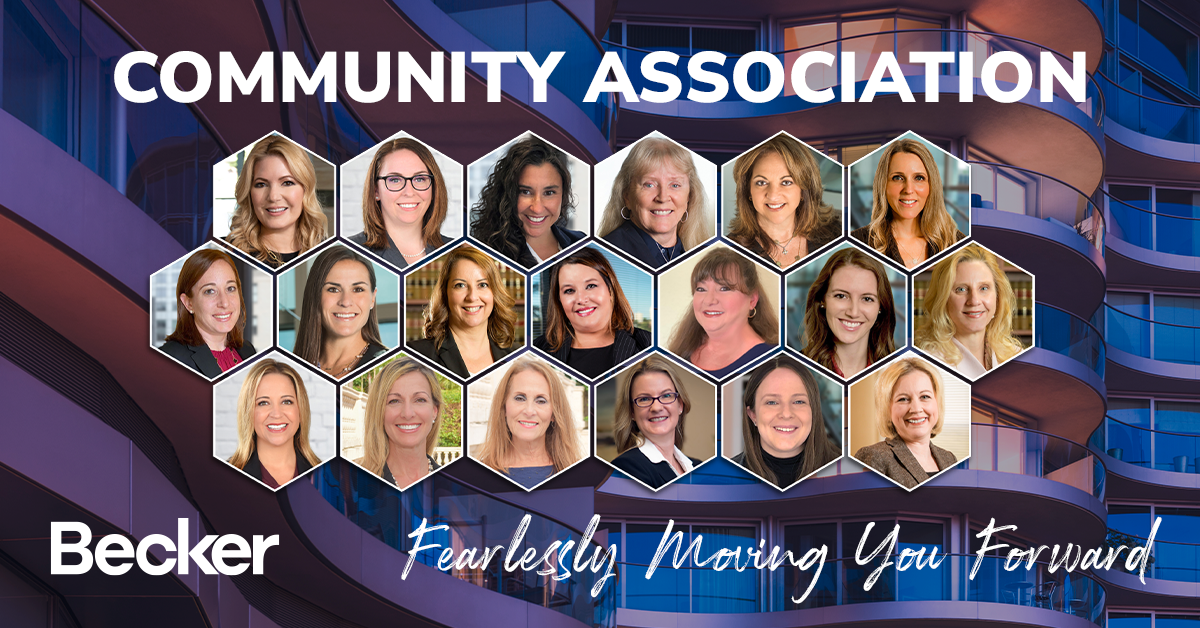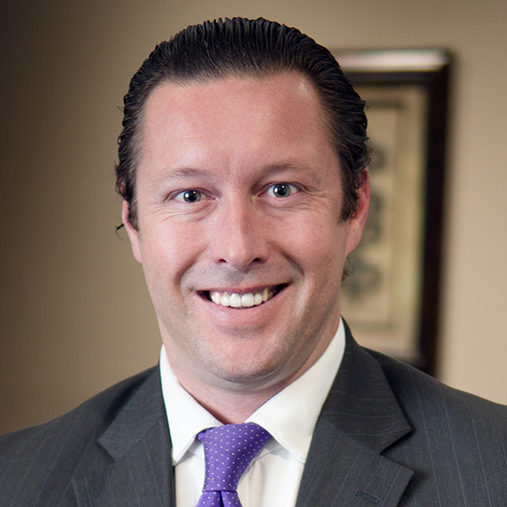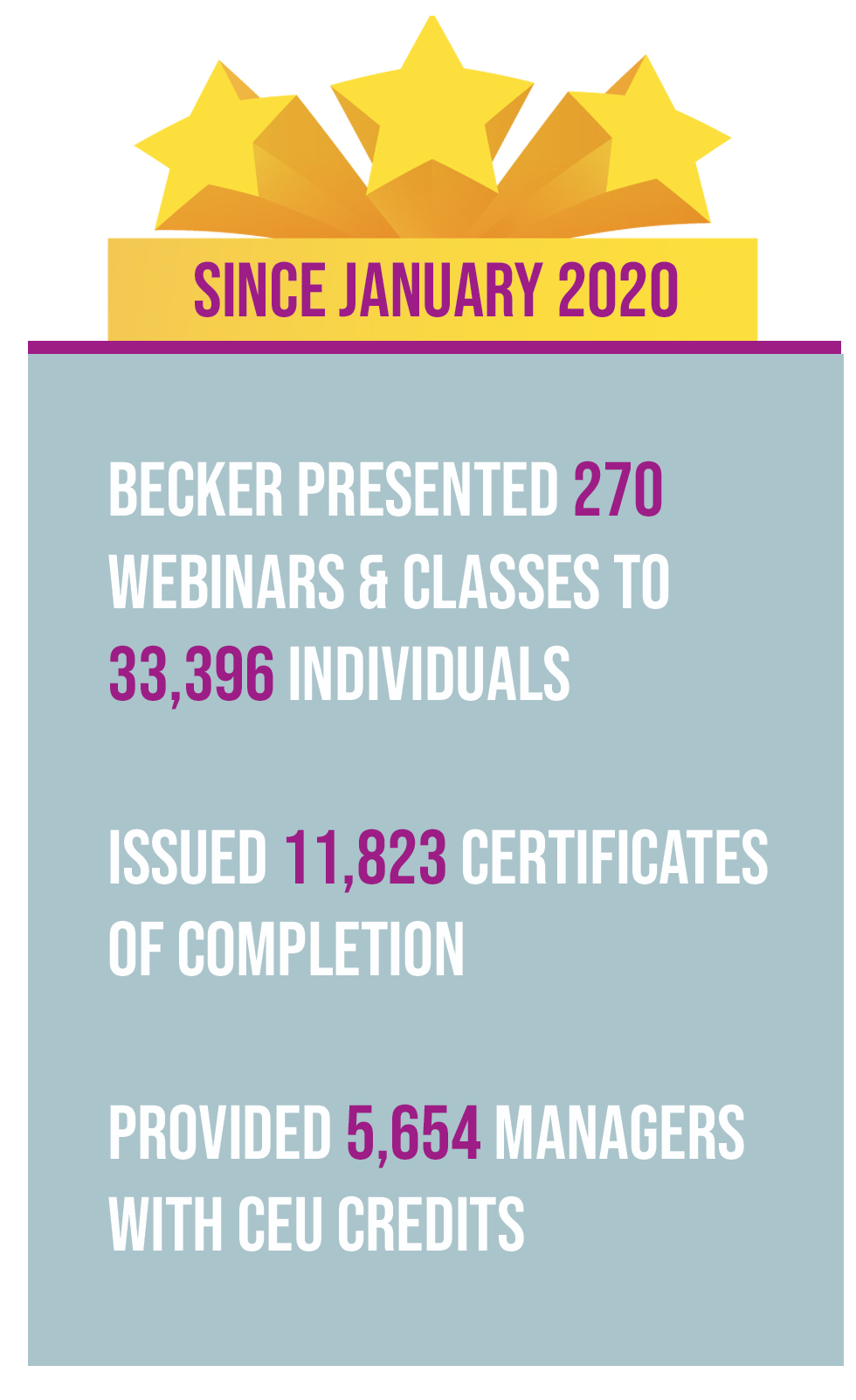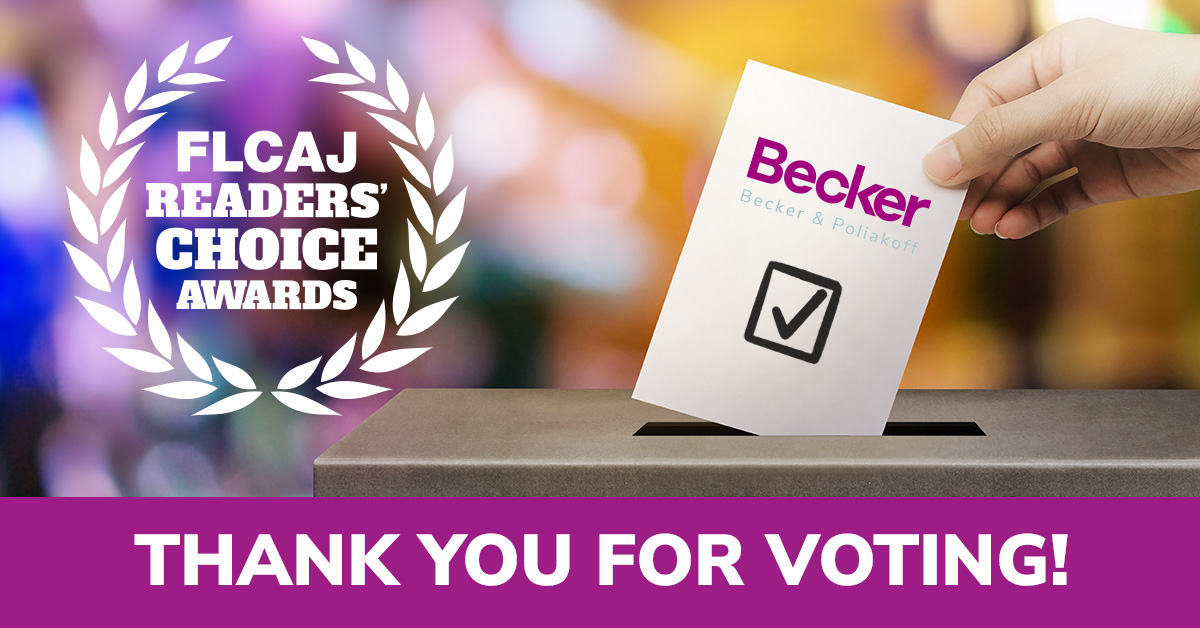Florida’s 60-day legislative session recently concluded without passing any major community association legislation. Find out what happened in this month’s “Did You Know” feature, and for a deeper dive on the topic, tune in to the most recent episode of Becker podcast, “Take it to the Board with Donna DiMaggio Berger.”
Construction projects, like life, are full of surprises, but unlike life, there are some things you can do to eliminate or minimize the impacts of those surprises. It all starts with your construction contract. Read more in this month’s featured article, “Top Five Tips When Negotiating a Construction Contract.”
Associations are wise to understand what each of the main covenant enforcement defenses mean as they are frequently raised. Learn more in, “Three Common Covenant Enforcement Defenses – Waiver, Estoppel, and Selective Enforcement.”
If your community association receives notice about a public hearing to consider or approve a development proposal on adjacent land, does the association or its members have a right to object? Find out in, “Community Association Due Process Rights with Respect to Neighboring Developments.”
Limitations on the judicial interpretation of statutes is at the heart of , “THIS CASE: Bay Holdings, Inc. v. 2000 Island Boulevard Condominium Association, Inc.” Find out why this case is important.
EDITORS
“Top Five Tips When Negotiating a Construction Contract”
By: David Milton / Scott Kiernan
Often even a small proposal for repair work can cause thousands of dollars in unanticipated costs later, which likely could have been avoided by association counsel. A few changes and/or a short addendum to a contract can be surprisingly affordable and possibly the best fiduciary decision a board can make in any given year.
Community Association Due Process Rights with Respect to Neighboring Developments
If your community association receives notice about a public hearing to consider or approve a development proposal on adjacent land, does the association or its members have a right to object? Yes, local governments must afford objecting property owners and residents procedural due process, which includes fair notice of the public hearings at which the proposal will be considered and a meaningful opportunity to be heard. However, the extent to which a community association and its residents “have the floor” to object to a proposed development during a public hearing depends on several things.
Three Common Covenant Enforcement Defenses – Waiver, Estoppel, and Selective Enforcement
By: Joseph Arena
Associations frequently find themselves in a position of strength when they wish to enforce violations of their convents. Where the terms of a covenant are unambiguous, courts will enforce such restrictions. However, it is not uncommon for an owner who has violated the covenants to scramble for defenses to try to justify his or her violations and give the association pause in its resolve to pursue enforcement. While successful owner defenses are by far the exception and not the rule, three particular defenses—waiver, estoppel, and selective enforcement—are raised with such frequency that associations are wise to understand what each of these is and when it might apply.

Bay Holdings, Inc. v. 2000 Island Boulevard Condominium Association, Inc.895 So.2d 1197 (Fla. 3d DCA 2005)
Limitations on the judicial interpretation of statutes is at the heart of THIS CASE. Bay Holdings, Inc. was a wholly owned subsidiary of Bank United FSB. Bank United FSB foreclosed its first mortgage on a condominium unit within 2000 Island Boulevard Condominium. Following the foreclosure, Bank United FSB assigned its rights under the foreclosure final judgment to Bay Holdings, Inc. Bay Holdings, Inc. took title to the unit following a judicial foreclosure sale. Bay Holdings, Inc. then asserted to the condominium association that it was entitled to the statutory “safe harbor” contained in F.S. 718.116. The condominium association disagreed, and a lawsuit ensued.
F.S. 718.116 provides a limitation on the liability of foreclosing first mortgagee or its successor or assignee to have to pay the condominium association unpaid assessments accruing prior to the foreclosure. However, the statute expressly limits “successor or assignee” to a “subsequent holder of the first mortgage.” F.S. 718.116(1)(g). Since Bank Unit FSB assigned its rights to Bay Holdings, Inc. after the mortgage had been foreclosed by the final judgment, the trial court held that Bay Holdings, Inc. was not a “subsequent holder of the first mortgage” and therefore not entitled to the “safe harbor.”
In affirming the trial court’s decision, the Third District Court of Appeals stated that F.S. 718.116 “clearly and unambiguously affords this safe harbor only to first mortgagees or ‘a subsequent holder of the first mortgage’” and Bay Holdings, Inc. was not a subsequent holder of the first mortgage. The Court then went on to discuss statutory interpretation limitations by stating:
As the Florida Supreme Court has recently reminded, “[w]e are not at liberty to add words to statutes that were not placed there by the Legislature.” (internal citations omitted). To do so, would be an abrogation of legislative power. Donato v. American Tel. & Tel. Co., 767 So.2d 1146, 1150 (Fla.2000); Holly v. Auld, 450 So.2d 217, 219 (Fla.1984) (courts are “without power to construe an unambiguous statute in a way which would extend, modify, or limit its express terms”).
So why is THIS CASE important? Courts serve distinct and limited functions, and those functions are to interpret and apply the law. If statutory text is unambiguous, the court must apply its plain meaning to the facts of the case in front of it.
Question of the Month
Q: Our manager recently told the board that there has been a change with “bank requests” and said the board needed to address it. I did not understand what that means or what the changes are. Could you please explain?
CALLING ALL BOARD MEMBERS AND COMMUNITY MANAGERS
As leaders in Community Association Law, we not only helped write the law – we also teach it.
Did you know Becker provides over 200 educational classes per year throughout the State of Florida on a variety of topics ranging from board member certification to compliance, and everything in between? Our most popular classes are now available online!
To view our entire class roster, visit:
beckerlawyers.com/classes
As a service to the community and industry, we are pleased to offer some of our most popular classes online for you to participate in from the comfort of your own home.
- Turnover From Developer Control
- Insights Into Your Role as a Board Member: Fiduciary Duty & Business Judgement Rule
- 2022 Legal Update
- Anatomy of a Water Leak
- Budgeting & Reserves
- Collection and Foreclosure Strategies for Community Associations
- Condo Board Member Certification
- Construction Road Map for Community Associations
- Top 10 Manager Do’s and Don’ts
- Construction Contracts and the Lien Law
- Construction Projects Gone Wild
- Dealing with Difficult People
- Disaster Preparedness and Recovery
- HOA/Condo Board Member Certification
- How to Properly Run an Election
- Take a Bite out of Fraudulent Assistance Animal Requests
- Understanding Our Bylaws
Becker Awarded FLCAJ Readers’ Choice Award for Eighth Consecutive Year
The FLCAJ Readers’ Choice Awards is a unique recognition program that shines a spotlight on the positive and productive contributions by community association service providers across Florida. These honors are bestowed on service providers who demonstrate an exemplary level of proficiency, reliability, fairness, and integrity to the community associations they serve.
We are proud of our contributions to the community association industry and are thankful to our readers and to the FLCAJ for this honor.
Can They Do That?
Becker’s “Can They Do That” video series tackles some of the unique problems that homeowners and renters face today. We answer your questions, no matter how far-fetched they may seem. From service animals to nudists in your community, we get to the bottom of it and let you know – “Can They Do That?”

Becker Steps Up to the Mic with Podcast,
‘Take It To The Board with Donna DiMaggio Berger’
Becker is thrilled to announce the launch of its community association-focused podcast, Take It To The Board with Donna DiMaggio Berger. For decades, our firm has served the legal needs of this industry through in-person conferences and roundtables, online educational webinars, in-depth blog posts, and easy-to-understand legislative updates; we are delighted to continue the conversation on yet another platform. Join us today!
CURRENT EPISODES:
- Royal Service with James Donnelly
- Fiscal Finesse with Nicole Johnson-Pendergrass
- Nuisance or Necessary: Solving the “Pet” Problem with JoAnn Burnett
- The Technology Tango with Brett Fielo
- Community Immunity with David Ramsey
- Considering the Cost of Counsel with Denise Lash
- Rules & Referencing with Howard Perl
- The Mental Health Challenge with Chris Ayub
- Reserve Funds & Studies with Robert Nordland
- Association Advocacy with Commissioner Mary Molina-Macfie
- The Job of the Journal with Michael Hamline
- HR Hacks with Jamie Dokovna – Part 1
- HR Hacks with Jamie Dokovna – Part 2
- The Art of Community Design with Patty Mowry
- Heart of Service with Stephanie Maher
- The Making of a Manager with Otto Freund
- Happy Holidays, Healthy Communities with Andrew Fortin
- Ensuring Community Association Safety with Platinum Group Security
- Building Basics with Construction Counsel Patrick Howell
- 2022 Legislative Session in Florida Wrap Up with Yeline Goin, Becker & Poliakoff
DID YOU KNOW?
The 2022 Legislative Session – What Just Happened?
The Florida Legislature concluded the 2022 Session without passing any major community association legislation. Several counties and the Florida Bar convened task forces in the aftermath of the Surfside tragedy. Primary among the suggested legislative changes for multifamily buildings were periodic engineering inspections, reserve studies and reserve funding mandates.


















